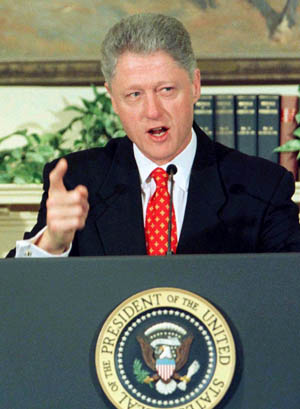Posted on December
27, 2023
Bubba's Bursting Bubbles
Hope is not a foreign policy
By
Daniel
Clark
Almost thirty years ago, two similar international
agreements were made that have dramatically shaped recent events, and not for
the better. The common denominator
between them is President William Jefferson Clinton.
In September 1993, President Clinton mediated the
signing of the first Oslo Accord, between Israeli Prime Minister Yitzak Rabin
and Palestinian Liberation Organization Chairman Yasser Arafat. Clinton had not been involved in creating the
substance of the agreement, which had already been negotiated in Oslo, Norway,
as the title would suggest. However, he
did endorse the finished product, by hosting the ceremony and having Secretary
of State Warren Christopher sign as a witness.
 The
accord provided for Palestinian self-rule in Gaza and parts of the West Bank,
from which the Israelis would withdraw.
In exchange, Israel got nothing verifiable, but only a promise of
peace. Arafat had agreed that the PLO charter
would be amended in order to recognize Israel's right to exist, an offer that
should have drawn immediate skepticism because it could not have been
accomplished by merely adding or revising a single clause. Rather, it would have required a total rewrite
of the document, whose calls for the destruction of the Jewish state are woven throughout.
The
accord provided for Palestinian self-rule in Gaza and parts of the West Bank,
from which the Israelis would withdraw.
In exchange, Israel got nothing verifiable, but only a promise of
peace. Arafat had agreed that the PLO charter
would be amended in order to recognize Israel's right to exist, an offer that
should have drawn immediate skepticism because it could not have been
accomplished by merely adding or revising a single clause. Rather, it would have required a total rewrite
of the document, whose calls for the destruction of the Jewish state are woven throughout.
Clinton encouraged Rabin to sign the deal without this
having been done beforehand. By taking
Arafat's word for it that the largely symbolic action would be taken at some
point in the future, Rabin was accepting an IOU for an IOU, from one of the
most untrustworthy men in the world.
The newly created Palestinian Authority never did
recognize Israel's right to exist. The
Palestinians voted out the PLO and put the Iranian-backed terrorist group Hamas
in control of the P.A. instead. With the
Israelis gone from Gaza, Hamas plotted against them, uninhibited, culminating
in the atrocities of this past October.
For America's part in this misguided "land for peace" deal, our own
assets throughout the Middle East are coming under attack by other Iranian
surrogates that are acting in concert with Hamas, suggesting the possibility of
direct warfare between the United States and Iran.
A little more than a year after Oslo, Clinton signed
onto another pact that had tragic results, and has involved America in another
conflict three decades later. The Budapest
Memorandum, signed by President Clinton, British Prime Minister John Major,
Russian President Boris Yeltsin and Ukrainian President Leonid Kuchma, required
Ukraine to give up the nuclear weapons it had possessed since the fall of the Soviet
Union.
 Ukraine
had needed its nuclear deterrent to prevent the Russian invasion that everyone must
have known would otherwise take place.
Nevertheless, it agreed to turn its nukes over to Russia, supposedly to
be destroyed, at the prodding of its Western allies who sought to contain
nuclear proliferation. In return, that
nation was assured by the other three heads of state that nobody would violate
its territorial integrity. Of course,
the Ukrainians did not trust Russia to uphold this agreement unilaterally. The assurance they needed came from the
President of the United States. Hence
our obligation to assist them, now that the inevitable Russian aggression is
being waged.
Ukraine
had needed its nuclear deterrent to prevent the Russian invasion that everyone must
have known would otherwise take place.
Nevertheless, it agreed to turn its nukes over to Russia, supposedly to
be destroyed, at the prodding of its Western allies who sought to contain
nuclear proliferation. In return, that
nation was assured by the other three heads of state that nobody would violate
its territorial integrity. Of course,
the Ukrainians did not trust Russia to uphold this agreement unilaterally. The assurance they needed came from the
President of the United States. Hence
our obligation to assist them, now that the inevitable Russian aggression is
being waged.
To his credit, Clinton now acknowledges and regrets
his role in setting the stage for the war in Ukraine, but how could a man who
had been entrusted with the most awesome responsibility in the world have failed to
see this coming? Just as in the case of
Oslo, he had encouraged a friendly nation to make a very costly substantive concession
in exchange for nothing more than an evil entity's word that it would behave
itself.
That's the kind of unseriousness we should have
expected of "the man from Hope" who wasn't really from there; the candidate who
went on MTV and told the kids what kind of underpants he wore; the man who
spoke in fluffy platitudes about hope and change, and then tried to come across
as a deep thinker by saying the word "profound" as often as possible; the
president who wiped away nonexistent tears and pretended to look across the
Korean DMZ after forgetting to remove the lens caps from his binoculars; the
superficial chief executive who said the one thing he would miss most about
being president was the White House movie theater.
Hope is not a solution, trusting the evildoers not to
do evil is not a foreign policy, and this uniquely insubstantial man should
never, ever have been made Leader of the Free World. Nevertheless he was, and now we're left to
deal with it.
The Shinbone: The
Frontier of the Free Press